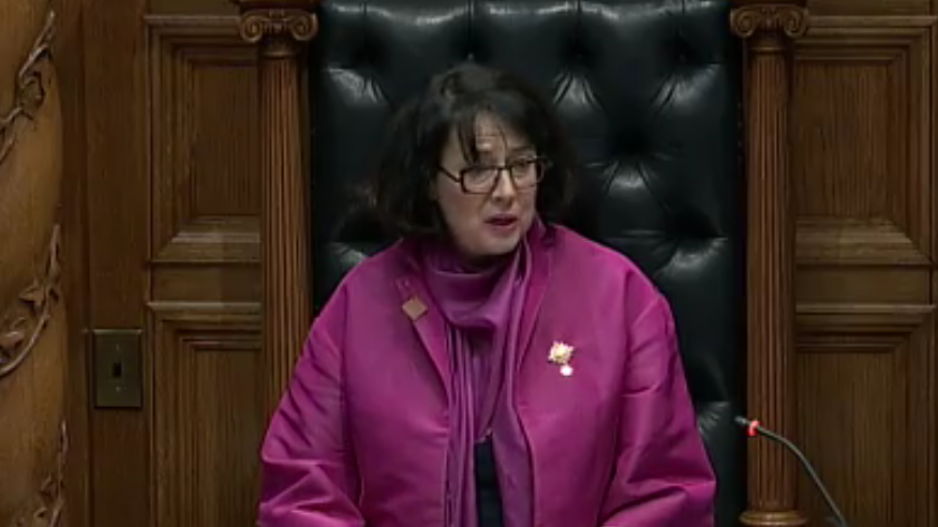The NDP government has its work cut out for it in 2019, as it plans to fully implement a new comprehensive child care program, eliminate MSP premiums, usher in ride hailing, stem the bleeding at Crown corporations, implement reforms in mining, forestry and fish farming, work on First Nations reconciliation and even tackle the problem of concert ticket scalping.
But the biggest challenge at hand may be restoring public trust in the Legislative Assembly itself, which has been rocked by a spending scandal made public by Speaker Darryl Plecas – something that was duly noted in a Throne Speech Tuesday, February 12.
Earlier this year, Plecas went public with a report that detailed a laundry list of questionable expenditures by the legislature’s clerk and sergeant at arms, and promised even more revelations to come, some of which may also implicate MLAs.
The NDP government is also dealing with a money laundering scandal at B.C. casinos – one that has been tied to the housing crisis, since real estate was used as part of the laundering scheme.
Even the United Church minister who gave the prayer before Tuesday’s official Throne Speech couldn’t help but note that B.C.’s MLAs are facing something of an ethics crisis.
“The ethical challenges are of Biblical proportion,” said Rev. Keith Howard, at the opening of the fourth session of the 41st Parliament of the B.C. Legislative Assembly. “The political tasks are even more daunting.”
Lt.-Gov. Janet Austin also acknowledged the cloud that hovers over the B.C. Legislature, saying the institution itself is built on public trust.
“That trust was recently shaken,” Austin said. “Your government will work with this assembly to implement reforms that restore trust in this institution.”
She also acknowledged the public outcry over a money laundering scandal involving B.C. casinos and real estate, saying the government plans to get to the bottom of the issue.
“Your government will identify the structural causes of money laundering to hold accountable those that are responsible,” Austin said.
As for budget issues, the government plans to fully implement a child care program that was partially rolled in the 2018 budget. It’s just one of the policies the NDP government has set as a priority to address affordability issues.
“Affordability remains the biggest challenge facing B.C. families,” Austin said.
"This government is making different choices, so that people can afford to live and work here, with action on affordable housing, lower costs and fees, and affordable child care for B.C. families."
Last year, the government cut MSP premiums in half. This year, they will eliminated entirely. That is equal to an $1,800 tax cut for an average family, Austin said.
“This is the largest middle class tax cut British Columbians have received in a generation, Austin said.
But what is a tax cut for ordinary British Columbians is a major tax hike for employers, who will be forced to replace the MSP premiums with a new payroll tax.
Other affordability measures this year include a continued freeze on BC Ferries fares for major routes, and continued investments in affordable housing.
Austin said the government will continue its review of BC Hydro, “and will be taking steps to protect ratepayers.”
That may mean having to write off more Crown corporation debt, as the government did in the last budget for both BC Hydro and ICBC.
One of the biggest budget items in this year’s budget may be the NDP government’s childcare program. The government has already committed $1 billion over three years to reduce child care expenses.
But that’s a fraction of what it was estimated to cost for the NDP’s promise of $10 per day daycare, so its full implementation will likely feature significantly in this year’s budget.
“This year, government will set the foundation for the full implementation of B.C.’s affordable child care program,” Austin said.
Austin said the government this year will also tackle other issues that concern ordinary British Columbians, including high cell phone costs and concert ticket scalping.
The government is planning to ban mass ticket buying software that allows large amounts of concert tickets to be scooped up and resold at higher prices.
As for industry, the government used the Throne Speech to detail the benefits that will accrue from last year's announcement of the $40 billion LNG Canada project, which Austin said will create 10,000 construction jobs, 950 permanent ones and $23 billion in government revenue "that will be reinvested in schools, roads, hospitals and services that families depend on."
The government also committed to continue to work on First Nations reconciliation, which will include legislation this year implementing the United Nations Declaration on the Rights of Indigenous Peoples.
While the Business Council of BC (BCBC) applauded the government's efforts to address affordability, it said the Throne Speech lacked any commitment to addressing the competitive disadvantage that B.C. businesses face from high taxes and regulatory burdens.
“Increased business operating costs, greater regulatory, legal and administrative complexity, and higher personal income taxes on skilled workers and entrepreneurs are among the headwinds that make it harder to attract capital and talent to B.C.,” said BCBC chief policy officer Jock Finlayson.
“Already, we see evidence of sluggish investment by many B.C. companies as well as moves by some firms to redeploy capital to other, more competitive jurisdictions, including the United States.”




